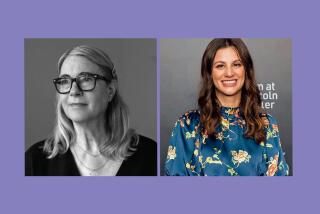Sundance Film Festival: Female directors take dramatic step forward
The odds of getting into the Sundance Film Festival have been astronomical for years, but the statistic that jumps out from the dramatic competition lineup for Januaryâs festival might be even more remarkable: In what festival programmers say is a Sundance first, fully half of the narrative features were made by women.
Culled from 1,227 submissions, the 16 dramas playing in the 2013 festival announced Wednesday cover a wide array of subjects and are populated by well-known actors (Casey Affleck, Daniel Radcliffe, Octavia Spencer, Jessica Biel) and complete unknowns. Many of the films, perhaps as a reflection of the gender of their directors, focus closely on personal, and often highly sexual, relationships.
âThey are very much womenâs stories,â said Trevor Groth, the festivalâs programming director. In the 2012 festival, only three of the 16 dramatic competition films were made by women. According to San Diego State Universityâs Center for the Study of Women in Television and Film, only 5% of the 250 highest-grossing films last year were directed by women.
PHOTOS: Sundance 2013 dramas in competition
John Cooper, the festival director, said the quantity of women directors for 2013 was not intentional, although he was proud of the 50-50 split. âEvery film has to stand on its own. You are just looking for original stories.â
Several of those women-driven stories are concerned with women seeking physical and emotional connections.
âIâm concerned with womenâs concerns â I like telling intimate stories about women, about what they want and what they feel,â said Liz W. Garcia, a prominent television writer (âCold Case,â âMemphis Beatâ) who wrote and directed âThe Lifeguard.â Garciaâs debut feature tracks a woman (Kristen Bell) who returns to her hometown and has a dangerous affair with a high school student. âIâm proud that my movie is very female,â Garcia said.
Stacie Passon wrote and directed âConcussion,â about a woman named Abby (Robin Weigert) who feels sexually abandoned in her marriage to another woman (Julie Fain Lawrence) and takes extreme steps to find companionship. Passon said that even with a lesbian relationship her film âis really about a mid-life crisis within a marriage.â
Running from Jan. 17 to 27 in Park City, Utah, Sundance is the nationâs top showcase for movies made outside the studio system. The 2012 festival launched âBeasts of the Southern Wild,â âThe Sessionsâ and âArbitrage,â all of which were directed by men, among other acclaimed independent productions that are considered likely awards season contenders.
Though many of the festivalâs more prominent titles are found in its premiere section (those films, which are typically made by more established directors with bigger budgets, are announced Monday), the competition titles tend to define the festivalâs personality.
âThe filmmakers are delving into some very compelling relationship stories,â said Cooper. âBut itâs coming from both female and male perspectives.â
The Sundance competition film with probably the most star-laden cast, âAinât Them Bodies Saints,â is writer-director David Loweryâs account of a fugitive (Affleck) trying to reunite with his wife (Rooney Mara). Lowery said that even with his high-profile actors (his cast includes Ben Foster and Keith Carradine) and Texas locations, he was trying to make âa very small filmâ about a coupleâs bond. âI really wanted to tell a story that was exceedingly simple that didnât have a lot of twists and turns,â Lowery said.
Two of the eight films helmed by women feature their directors (Lake Bell and Cherien Dabis) playing the lead roles. âThe performances just come through as more connected and more authentic,â Cooper said. âBut weâve also seen it backfire on some people.â
In Bellâs feature debut, âIn a World...,â she plays a voice-over artist whose father (Fred Melamed) is in the same profession and isnât entirely welcoming of his daughterâs fledgling success. âHis insecurity stands in the way of his being supportive of his daughter,â said Bell, whose short film âWorst Enemyâ played at Sundance in 2011. âIâve seen a lot of father-and-son competition, and I liked the fresh idea of giving the competition to the daughter.â
Bell said even though it wasnât essential that moviegoers detect that her film was directed by a woman â âI think itâs clear it was directed by a daughter, if anything,â she said â she was pleased that so many women, including herself, were part of the Sundance slate. âI like the idea of my two little sisters feeling proud and empowered,â Bell said.
Dabis, whose âMay in the Summerâ will open the festival, said her movie was shaped by growing up with four sisters. In the film, Dabis plays May, a Christian woman engaged to a Muslim man. When May visits her Middle Eastern family, she is forced to confront pressure from all sides of the clan, including her siblings. âAt its core, at its heart, itâs very much about family, and about a character struggling with her own sense of truth,â Dabis said.
Dabisâ previous feature, âAmreeka,â premiered at the festival in 2009. She said she was gratified to be among so many women filmmakers selected for next yearâs festival. âItâs very exciting given how few women there are in the industry,â Dabis said.
âBut Iâve never experienced any kind of prejudice except when it comes to financing. Men are generally entrusted more easily to large amounts of money,â Dabis said.
The next test for the competition filmmakers is to find a distributor in Park City. But for now, the directors are enjoying the moment, having survived the first cut, from 1,227 to 16.
âI was absolutely speechless when John Cooper called to say I was in,â Bell said. âIt is so cool.â
MORE COVERAGE
PHOTOS: Memorable red carpet moments
TIMELINE: Academy Awards through the years
More to Read
From the Oscars to the Emmys.
Get the Envelope newsletter for exclusive awards season coverage, behind-the-scenes stories from the Envelope podcast and columnist Glenn Whippâs must-read analysis.
You may occasionally receive promotional content from the Los Angeles Times.











